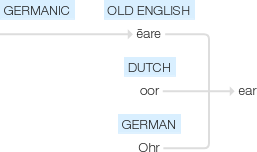Ear
Old English ēare, of Germanic origin; related to Dutch oor and German Ohr, from an Indo-European root shared by Latin auris and Greek ous .
wiktionary
From Middle English ere, eare, from Old English ēare(“ear”), from Proto-West Germanic *auʀā, from the voiced Verner alternant of Proto-Germanic *ausô(“ear”) (compare Scots ear, West Frisian ear, Dutch oor, German Ohr, Swedish öra, Danish øre), from Proto-Indo-European *h₂ṓws (compare Old Irish áu, Latin auris, Lithuanian ausìs, Russian у́хо(úxo), Albanian vesh, Ancient Greek οὖς(oûs), Old Armenian ունկն(unkn), and Persian هوش (huš)).
From Middle English eere, er, from Old English ēar ( Northumbrian dialect æhher), from Proto-Germanic *ahaz (compare West Frisian ier, Dutch aar, German Ähre), from Proto-Indo-European *h₂eḱ-(“sharp”) (compare Latin acus(“needle; husk”), Tocharian B āk(“ear, awn”), Old Church Slavonic ость(ostĭ, “wheat spike, sharp point”). More at edge.
From Old English erian, from Proto-Germanic *arjaną, from Proto-Indo-European *h₂erh₃-(“to plough”).
etymonline
ear (n.1)
"organ of hearing," Old English eare "ear," from Proto-Germanic *auzon (source also of Old Norse eyra, Danish øre, Old Frisian are, Old Saxon ore, Middle Dutch ore, Dutch oor, Old High German ora, German Ohr, Gothic auso), from PIE *ous- "ear" (source also of Greek aus, Latin auris, Lithuanian ausis, Old Church Slavonic ucho, Old Irish au "ear," Avestan usi "the two ears").
þe harde harte of man, þat lat in godis word atte ton ere & vt atte toþir. [sermon, c. 1250]
In music, "capability to learn and reproduce by hearing," 1520s, hence play by ear (1670s). The belief that itching or burning ears means someone is talking about you is mentioned in Pliny's "Natural History" (77 C.E.). Until at least the 1880s, even some medical men still believed piercing the ear lobes improved one's eyesight. Meaning "handle of a pitcher" is mid-15c. (but compare Old English earde "having a handle"). To be wet behind the ears "naive" is from 1902, American English. Phrase walls have ears is attested from 1610s. French orielle, Spanish oreja are from Latin auricula (Medieval Latin oricula), diminutive of auris.
ear (n.2)
"grain part of corn," from Old English ear (West Saxon), æher (Northumbrian) "spike, ear of grain," from Proto-Germanic *akhuz (source also of Dutch aar, Old High German ehir, German Ähre, Old Norse ax, Gothic ahs "ear of corn"), from PIE root *ak- "be sharp, rise (out) to a point, pierce" (source of Latin acus "chaff, husk of corn," Greek akoste "barley").
